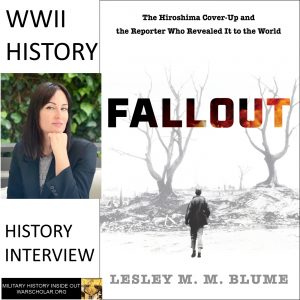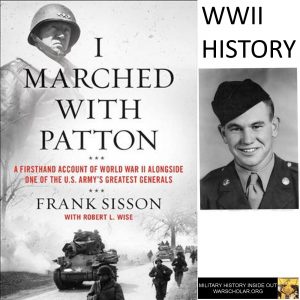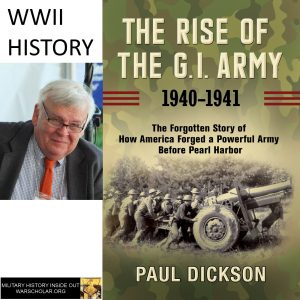Podcast: Play in new window | Download
Subscribe: RSS

Lesley M.M. Blume interview about her WWII history book John Hersey and his 1946 reporting about Hiroshima
Check out this book here https://amzn.to/3jrcwFt
Interview Summary
Lesley M.M. Blume is an award-winning journalist, historian, and bestselling author. She’s written a huge amount of material and her latest publication, Fallout, is a study of John Hersey’s reporting on the aftermath of the Hiroshima bombing. We spoke about the book, about John Hersey’s work, about Lesley’s research and about freedom of the press.
(THE AUDIO PLAYER IS AT THE BOTTOM OF THE POST.)
Arkady Martine talks about her sci-fi novel “A Memory Called Empire” https://wp.me/p7CDU9-4Z1
James Miller talks about the early days of nuclear power in subs and about the NASA NEAR mission http://spacewalksmoneytalks.com/p/605
1:17 – Lesley talks about why she wrote a book on Hiroshima and John Hersey.
3:20 – Lesley talks about how reporters covered Hiroshima and Nagasaki bombings. She talks about how MacArthur’s staff was able to quickly control reporting on the bombings.
6:52 – Lesley talks about how the US government and military presented the atomic bombs to the public.
9:17 – Lesley talks about what people might have thought if the bomb had also been dropped on Germany.
13:26 – Lesley talks about how John Hersey got into Japan to write his story on Hiroshima.
16:02 – Lesley talks about how Hersey got around Japan.
19:09 – Lesley compares conditions for reporters in WWII versus wars now.
20:30 – Lesley talks about the Christian missionary that Hersey first interviewed.
22:20 – Lesley talks about how Hersey got his manuscript approved. She also talks about the protection of nuclear data during WWII.
27:06 – Lesley talks about the research she did for this book.
30:22 – Lesley talks about the SCAP papers that were left behind in Japan.
34:17 – Lesley talks about her FOIA requests to the CIA and FBI.
36:00 – Lesley talks about how enjoyable her archival research was.
38:57 – Lesley talks about the nostalgia and noir feel of the time period she studied.
40:40 – Lesley talked about some of the help Hersey got in Japan.
44:05 – Lesley talks about being surprised that the New Yorker carried Hersey’s story since it was a niche humor magazine.
45:09 – Lesley talks about wishing she could have seen the notes between the military and the New Yorker.
47:49 – Lesley talks about Japanese reaction to the story.
50:43 – Lesley talks about how the Soviet Union censored the story in the USSR.
51:52 – Lesley talks about some of the emotional impact of her research. She says the recountings of American POWs and the atrocities committed by the Japanese were torturous to read. She also discusses the importance of protecting the press.
57:34 – Lesley talks about how you can trust the press if it serves as a mouthpiece of the government or companies.
1:00:12 – Lesley talks about the reporters during WWII who simply reported what the government wanted them to. She also talks about the anxiety she had about publishing during Covid.
1:05:48 – Lesley can be found at lesleymmblume.com and on twitter @lesleymmblume.
Links of interest
https://www.simonandschuster.com/books/Fallout/Lesley-M-M-Blume/9781982128517
https://www.lesleymmblume.com/
https://twitter.com/lesleymmblume
Arkady Martine talks about her sci-fi novel “A Memory Called Empire” https://wp.me/p7CDU9-4Z1
James Miller talks about the early days of nuclear power in subs and about the NASA NEAR mission http://spacewalksmoneytalks.com/p/605
Contact Information
For more “Military History Inside Out” please follow me at www.warscholar.org, on Facebook at warscholar, on twitter at Warscholar, on youtube at warscholar and on Instagram @crisalvarezwarscholar. Or subscribe to the podcast on Apple Podcasts | Google Podcasts | Stitcher | Spotify Please see historyrabbithole.com for a list of my dozen or so blogs and podcasts. You’re sure to find something you like.
Guests: Lesley M.M. Blume
Host: Cris Alvarez
Tags: Books, audio interviews, author, podcast, Simon & Schuster, WWII, United States,
Check out this book here https://amzn.to/3jrcwFt
As an Amazon Associate I earn from qualifying purchases.



